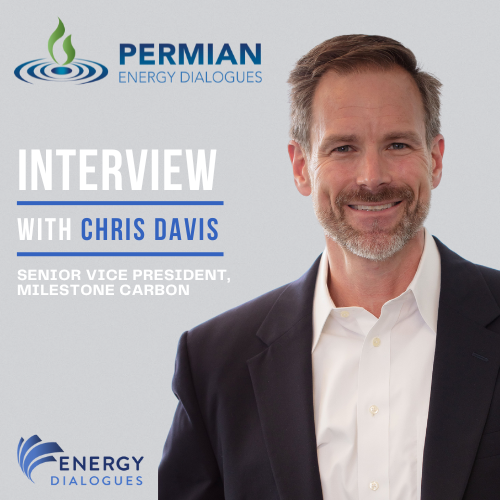
Tell us about your current role and Milestone Carbon’s activities and focus
Thank you for this opportunity. As the Senior Vice President for Milestone Carbon, I’m excited to share our journey and vision. We established Milestone Carbon about three years ago to extend the sustainability themes embraced by our parent company, Milestone Environmental Services. Our core mission revolves around managing and disposing of waste in the energy industry through sustainable methods. Integral to this mission is our focus on carbon accounting, which allows us to quantify avoided GHG emissions and carbon equivalent emissions sequestered. This foundational approach is what underpins Milestone Carbon’s identity and direction.
Our goal at Milestone Carbon is to leverage the principles we’ve developed within the energy sector and extend them into the realm of carbon capture and storage (CCS). While our roots are in the energy industry, we’ve recognized the importance of addressing carbon emissions across a broader spectrum, including heavy industry. This sector, often overlooked in the discourse on greenhouse gas emissions, is critical to achieving our overall decarbonization objectives.
In your experience, what are the biggest drivers for energy companies’ decarbonization?
When considering the factors driving our customers towards decarbonization, it’s important to look beyond just the incentives. While incentives do play a role, the real impetus comes from a societal shift towards sustainability in response to the undeniable realities of climate change. Companies, especially those in the energy sector, are acknowledging that this is not a transient trend but a fundamental transformation. It requires significant investment in both business practices and environmental stewardship, ensuring that these changes are implemented thoughtfully to maintain value and standards of living.
Sustainability has also become a moral imperative for younger generations entering the workforce. This demographic views environmental stewardship not just as an operational necessity but as an ethical obligation. This shift is profoundly influencing corporate strategies. At Milestone Carbon, we aim to partner with companies seeking to decarbonize, offering flexible commercial structures that provide the necessary adaptability and options for effective implementation. We often joke that we are “carbon cemetery developers,” highlighting our role in identifying and securing optimal locations for carbon sequestration. This process involves navigating complex requirements related to permitting, land ownership, stakeholder engagement, and the high costs of developing these projects.
For these reasons, scalability is crucial for our solutions, as they must grow in tandem with our customers’ evolving requirements. Our focus is on onshore development, particularly on projects where emission sources are within a manageable distance, typically around 30 miles. We avoid long pipelines and offshore solutions, concentrating instead on sustainable waste disposal especially within the Lower 48 states. Our emphasis is on regions that are supportive of CCS initiatives, allowing us to prioritize high-quality projects and build trust within the communities we serve.
How is the industry tracking in terms of adoption of carbon sequestration solutions? And how do you see this trending over the next decade or so?
The oil and gas industry’s expertise has been instrumental in advancing CCS technologies. Many energy companies are integrating CCS with their existing operations, such as hydrogen and LNG development. However, as CCS evolves, these companies may increasingly concentrate on their core competencies, leaving specialized activities like carbon sequestration to partners like Milestone Carbon. This collaborative approach enables energy companies to excel in their primary areas while leveraging our expertise in sustainable environmental infrastructure.
Eventually our industry is poised to address the growing need for sustainable power generation, especially in regions like Texas and the Gulf Coast. Dispatchable power generation with CCS is a viable solution to complement existing energy sources, and our hubs are designed to support this transition. By focusing on high-quality projects and fostering collaboration, Milestone Carbon aims to contribute significantly to the decarbonization of various sectors, ensuring a sustainable future for generations to come.
What are some of the impediments to enabling higher levels of carbon sequestration? And how do you think they could be overcome?
Investment and community acceptance are critical challenges in CCS projects. While community engagement is essential, we find that industry and regulatory collaboration can significantly address these concerns. Understanding each other’s perspectives and building trust between the public and private sectors is crucial for accelerating CCS deployment.
A significant bottleneck we encounter is gaining clarity from senior levels within heavy industry and energy operators. Working-level teams within these companies are often enthusiastic about CCS projects, recognizing their importance and potential. However, these initiatives sometimes struggle to gain traction at the board level, where decisions are made between traditional growth projects and first-of-a-kind capture facilities. It’s crucial for investors and senior leaders to provide clear directives on capital allocation, balancing traditional projects with sustainability-oriented investments.
The Permian Energy Dialogues is a couple of months away. What excites you the most about this event and what key discussions are you most looking forward to?
The upcoming Permian Energy Dialogs offer an excellent platform for discussing regulatory and industry perspectives on CCS. Having representatives from regulatory bodies like the EPA and the Texas Commission on Environmental Quality will facilitate meaningful discourse and build the trust needed for successful projects. Collaborative efforts can lead to innovative, cost-effective solutions that meet environmental objectives.
At Milestone Carbon, we emphasize the importance of getting projects off the ground, even if the initial costs and challenges are significant. Establishing realistic targets and making incremental progress towards decarbonization is more effective than setting unattainable goals that might deter action. We advocate for a practical approach, focusing on abating emissions in specific areas of business while trending towards broader net-zero ambitions.


















